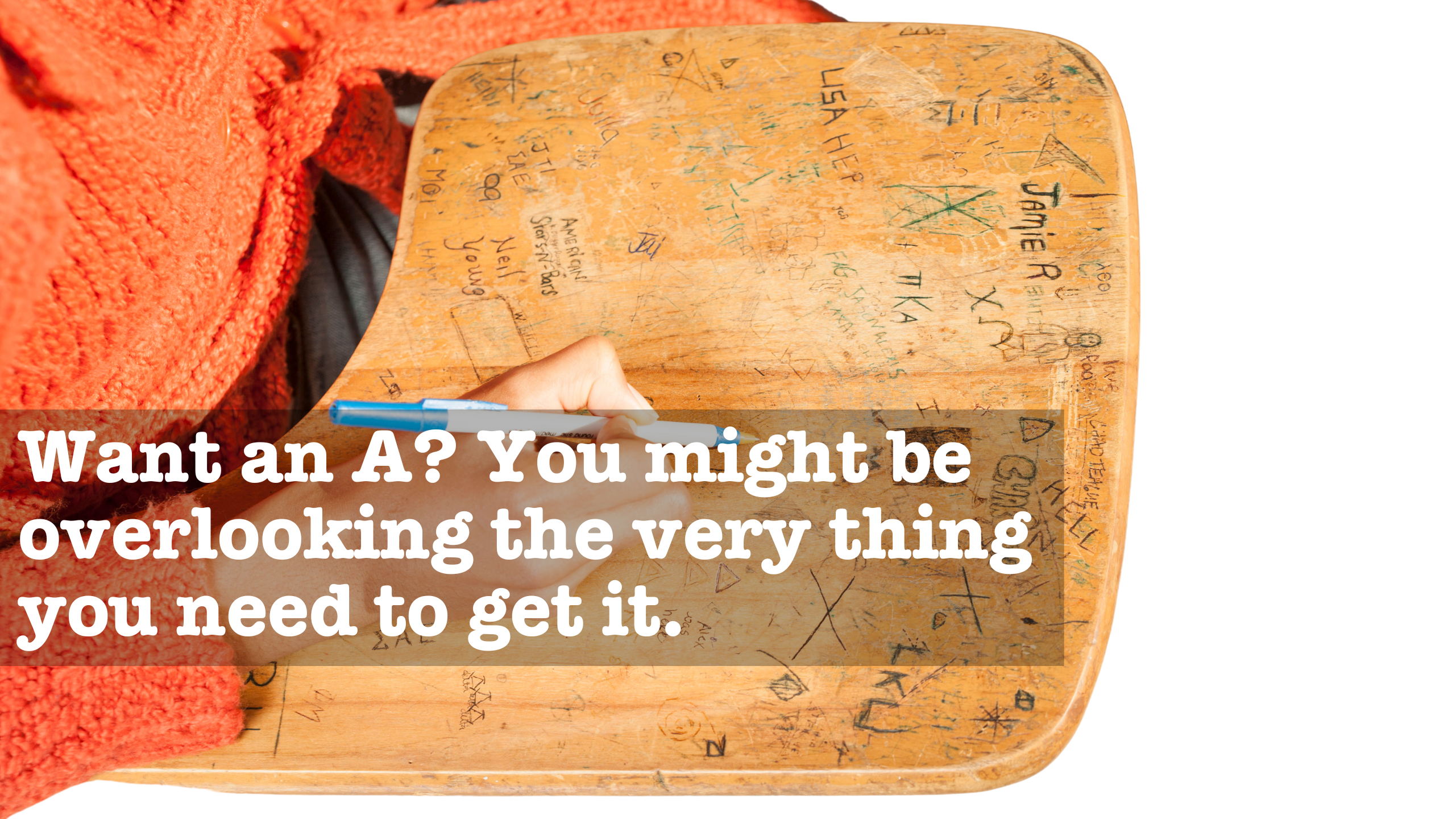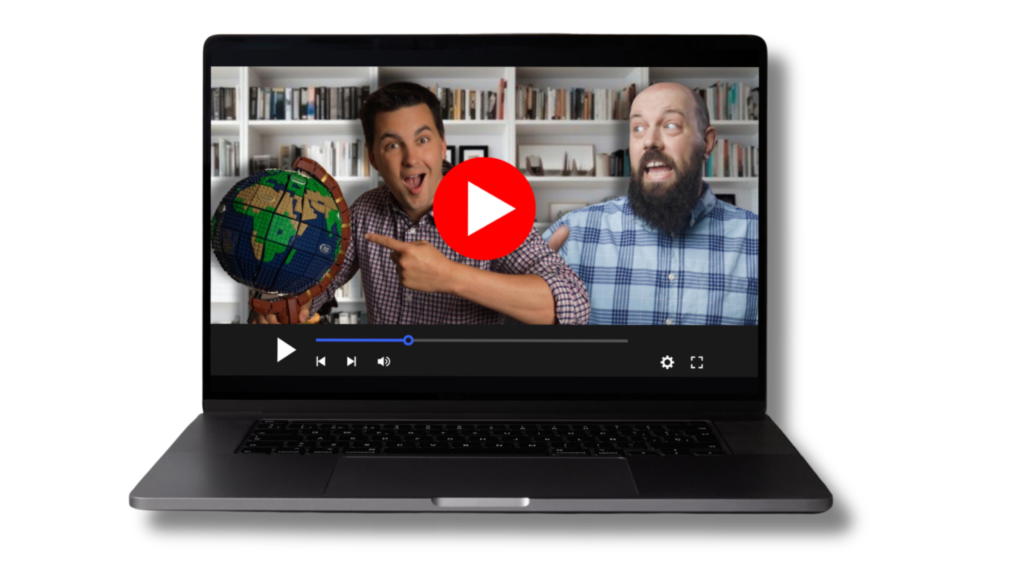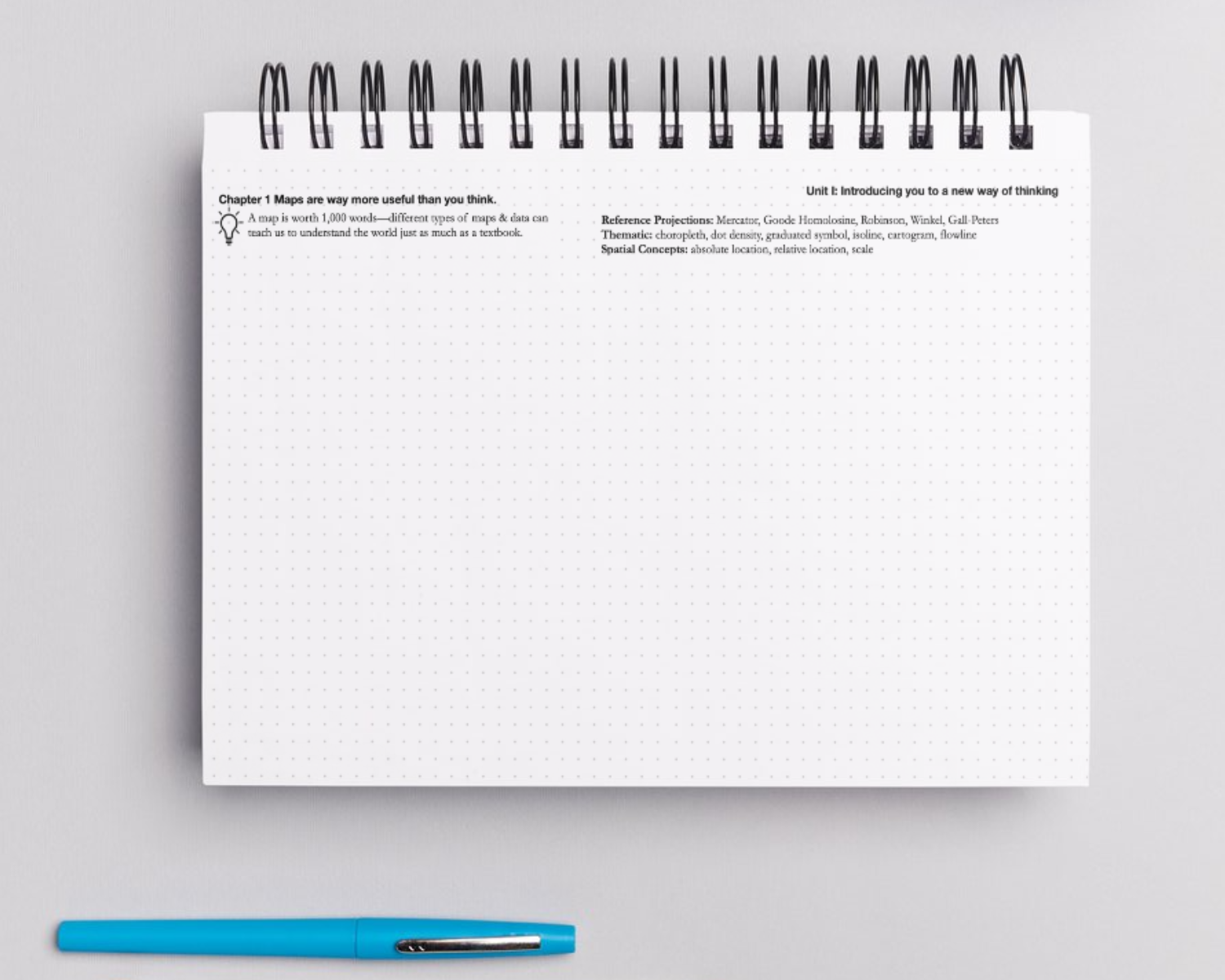

AP students want to do well and want the reward of an A. They work tirelessly, pour hours into assignments, track every point and percentage, laser-focused on getting that A.
On the other side of the classroom, your teacher is crafting lessons and assignments that give you opportunities to learn, practice, and grow. While you are busy thinking about points, I am thinking about the exam I’m drafting in my head throughout a unit.
We both want the same thing–your success. I want you to have that A too, but there’s a disconnect that can sometimes make it seem like we’re working against each other.
Teacher POV: I prioritize the process of you understanding, learning, knowing, and remembering so that you can use it on an exam, quiz, or other assessment where you will earn the A.
Student POV: Students might prioritize completing something in an efficient way that maximizes the point value of that assignment with the logic that it’s points that add up to grades.

The differences between these two POVs might seem small, but that’s the disconnect. They’re actually really different in practice.
If you want the A, do this instead.
I’m not thinking about points. I’m playing the long game trying to get you to a point of deep understanding of content and prepared to demonstrate mastery of a skill.
I may not assign points to an assignment or activity because I’m using it as a tool to teach you something, not as an assignment to assess your understanding. When I see a student blow off an assignment or activity, I am thinking about how that assignment connects to something on an exam.
Please don’t put yourself in situation where you suddenly find yourself with a poor grade and your only option is…

Care about the grade, but focus on content and skills.
A guy named Frank walks into a bank to ask for some help from a bank-teller. Frank tried getting money out of his account, but his card was declined. Frank asked the bank-teller, “what can I do about my bank account?”
The bank teller stares at Frank with a confused look, she doesn’t know what to say.
“Well Frank,” she says, “you spent all of your money, and now there’s no money left”
“Yeah,” Frank says, “but my rent is due tomorrow and I was wondering if there was anything I could do to raise my balance?”
Still confused, the teller explains, “I can show you why your account is empty, but I can’t do anything about the amount. You have to go earn more money.”
Like the bank teller, I can show you the individual scores that make your grade what it is, but I can’t do much to help “fix” it.
I can, however, help you understand, learn, practice and grow so that you can earn a higher grade. Keep your focus on understanding content, improving your learning and studying skills, and earn that higher grade. Here’s what you’ll need to do to do that.
Get comfortable asking questions.
One of the most challenging aspects of teaching AP courses is getting students comfortable asking questions. As an AP student, you at a very high risk of struggling with imposter syndrome. Most, if not all, AP students struggle with this to some degree this year. You need to be aware of your level of risk so that you can remind yourself of the following:
You belong here so long as you are ready to commit to something challenging. As long as that’s true, you belong in this room, and in this class.
Asking questions is part of the learning process, so if you’re not doing it–you probably aren’t learning either. Asking questions help you understand. Understanding is necessary to learn. And learning is necessary to knowing and remembering. Knowing and remembering is what you’ll need to get an A. Get ready to hear this over and over again!
- If you aren’t asking questions because you feel embarrassed, practice asking in an environment where you won’t be as nervous: coming up to my desk, ask it when I’m not addressing the entire class, come early or hang back a min late, swing by during flex, after school, lunch, etc.
- Try using Chat-gpt as a tutor: Start a thread and give a prompt like “in this thread you will act like my AP Human Geo/AP Gov tutor, I will ask you questions and you will explain concepts to me like a teacher”
- If you aren’t asking questions because you don’t know what to ask, start by considering the title of the chapter, the “what you need to learn” lightbulb box, and all of the terms. That’s your study guide for each chapter, so at the very least you can ask about one of those specific concepts.
Treat every assignment and lesson like a Jenga block, not a point value.

Your ability to perform well on assessments depend on the stability of your skill and understanding, and every day, assignment, lesson, and homework chapter is like a jenga block.
If you keep your focus on building a stable understanding of content and required skills, the grades are going to take care of themselves.
You cannot expect to do well on these assessments if you miss class, don’t complete assignments, have blank pages in your notebook, take poor quality notes, and avoid asking questions about content you’re required to learn.
How to build a stable understanding & set yourself up for success
I spend a lot of time (and money) building tools for you to make the process of deep learning as easy for you as possible. I share that with you to convey the worth of these tools and encourage you to see them as worth your effort to use them.
So, if you want to set yourself up for success, use the tools that were built for you: your notebook, the resources and features on the website, the plethora of practice questions you’ll have access to on platforms like Quizizz and Kahoot, and the grading system explained later.
Instead of a horrible and ineffective textbook, I’ve built you a website that has video, audio, visuals, and a reading section that directly relates to your chapter. Instead of dry handouts, or leaving you to figure it out on empty binder paper, I’ve built you a custom notebook that has exactly what you need to learn, and matches every chapter you’ll get assigned.
And instead of cramming a long list of required AP/Collegeboard content into your brain, I’ve thoughtfully re-designed both AP courses so the relevance and deeper understanding of every chapter is apparent.
Please take advantage of this!
Read every chapter title and every chapter’s “lightbulb”
The titles are not regular generic unit titles. I wrote them to communicate why the content matters and how it applies to the world. The title is the over-arching understanding I want you to remember long after you’ve moved on and forgotten some of the chapter content. The titles are in your notebook, and in these blue boxes at the top of every chapter.


The lightbulb directs you to the content you need to learn and understand for that chapter.

Terms, concepts, and vocabulary are the individual things or pieces you need to learn and eventually know in order to learn what you’re supposed to learn. If the lightbulb is what you need to learn, the terms are how you’ll learn it.
Terms
Concepts
“Taking notes” is much more than just writing stuff down, learn how to do this well.
The biggest mistake students make is taking notes in really ineffective and time consuming ways that make them feel like they are putting in the effort, but don’t improve their grade.
Simply hitting play and then pausing every few moments to write everything down turns you into a human photocopier. The most common pitfall here is that you don’t really know what’s important, so you lean towards writing everything down. You become so busy copying and writing that you never realize that you don’t really understand what you’re writing!
Do this instead. At first it sounds like more work, but it’s not. It’s smarter work, that works better, and saves you hours of re-learning and cramming.
1. Focus on the big picture first, watch, read, and listen without taking notes first. Just focus on understanding. You have to understand something before you can learn it. And you have to learn something before you know it. And you have to know something before you can remember it. This first step of the learning process is called priming. You need to prime your brain to prepare it for what it needs to learn.
2. After you understand something, it’s time to use the physical and mental activity of creating a page of notes to make sense of it and learn it. Go back through a second time and begin your notes. Take it one piece of learning at a time. Use the study guide to know how to do this.
3. Now focus on figuring out how the individual things you just learned and took notes on help you understand the lightbulb. You want to get to the point where someone could ask you about that lightbulb, and you’d be able to explain it. When you can do that, you’ve learned it.
To get to that last step of knowing and being able to remember something, you will need to use it, think about it, and talk about it. That’s where class participation and asking questions will become most important.

Become an active note-taker, and avoid passive note-taking.




Read it. Listen to it. Do both. The audio feature on the website isn’t cheap, but it’s effective and valuable. Use it!
You can use it in a way where it helps you read the text: Sometimes students have an easier time picturing content and or staying focused if something is read aloud while you are reading. Try it and see if that works for you!
Use it after you’ve watched the video to polish up your notes: A good way to go back through your notes, and make the physical activity of taking notes more effective, is to listen to the text and use it to add detail, fill in gaps, and revise your notes. Try it and see if that works for you!
Use it as a casual low pressure way to “start” your learning: Sometimes you procrastinate starting a chapter because of the pressure of “doing it later when I can have total focus and motivation”. Listen to a chapter without your notebook, without the pressure of “doing it right and learning everything” in a casual way like while you’re walking, on the bus, sitting in the car, etc. This can be a VERY effective way of priming your brain for your learning/note-taking session. Try it and see if that works for you!
Course & Grade FAQs
Is there extra credit?
Not the type that allows you to buy a better grade with some extra busy work. Remember what’s discussed at the top of this page. If you’re focused on building a stable understanding of content and mastering the necessary skills, then the grade will follow and take care of itself. Click here
BUT, after the exams are scanned, I always take a closer look at questions with high rates of incorrect answers. If it meets a certain set of criteria, I may adjust the key to change the question to extra-credit, awarding those who got it right while minimizing the weight of the question for those who missed it. So, there are opportunities to EARN an extra credit point by staying focused in class, staying focused on understanding, and staying dedicated to learning. Remember to care about your grade, but focus on learning.
How are exams & quizzes graded?
If you got a 90% on an exam, you did not get 90% of the questions correct. You earned an A-, and Synergy is programmed to show you a percentage. The exams are written to present a challenge to every student with opportunities to demonstrate varying levels of mastery. On an exam like that, answering half of the questions correct does not mean you only learned half of the content you were responsible for learning and earned an F. The scoring on unit exams is more similar to how the AP exam, or the SAT/ACT is scored, you don’t need to get above 90% correct to get a good score, especially if you correctly answer one of the questions that become extra-credit (see answer above).
Can I re-take the exam if I don’t like the grade?
Not exactly. Traditional exam re-takes are generally not available, but every student does get an opportunity similar to a re-take on the following exam. Each exam is cumulative, and past exam questions will appear on subsequent exams. Since those subsequent exams are always at-least double the points of the previous exam, everyone gets the opportunity to re-learn, improve their skills, and gain the benefit of a built-in retake to improve their grade. Click here
What happens if I miss an exam or a quiz?
I will post exam/quiz dates as soon as I know them. It is up to you to arrange your schedule so you are present for your exams/quiz. If you have an unavoidable absence you need to make arrangements to take your exam within 5 school days. After the 5 day period has passed your exam grade will change from an “M” to “F”. Students taking a late exam or quiz may take an alternative quiz or exam to maintain exam integrity.
Can I turn in something late
The gradebook stays open for the entire semester so that you can stay focused on the long game and benefit from subsequent exam values replacing previous exam attempts in the gradebook, not to accept endless late work. A late assignment must be submitted within 3 school days unless you have a pre-arranged extension.
Can you give us a study guide for exams?
YES! In fact, I already did. Your notebook, chapter titles, the “what you need to learn” prompt, and the list of terms is a thoughtful and strategically written guide to make it absolutely clear what you need to learn for each chapter, unit, and course. All exams and quizzes will be based on these resources.
How should I study for assessments?
If you are asking this question, you might need to answer another question first: what is studying? Many students get stuck in a trap where they think they are studying, fool themselves into feeling prepared, then perform poorly on an assessment, and get the false message that something is wrong with their intelligence or memory. Here’s a whole page with three sections dedicated to improving your study behaviors.
How do I improve my grade?
Start here. I know it can feel counterproductive, but if you want to improve your grade, you have to stop asking about the points and improving grades and start asking about the content and skills. Imagine a student athlete that has not attended practice for a while, has not done the hard work of working out and eating healthy ask their coach how they can win their upcoming game. Grades are a reflection of your past performance and work, you cannot “fix” your grade, you can only focus on learning content and improving skill.
How do I improve my understanding of content?
MUCH better question! When it comes to understanding content, you need to first make an attempt to understand it on your own. You’re not really going to know what to ask of your teacher until you’ve gone through this process. This does not mean: try to figure it out yourself and only ask the teacher if you failed to understand. It actually means: you will have a much better understanding of the questions you need answered, and you’ll benefit much more from the discussion with your teacher.
